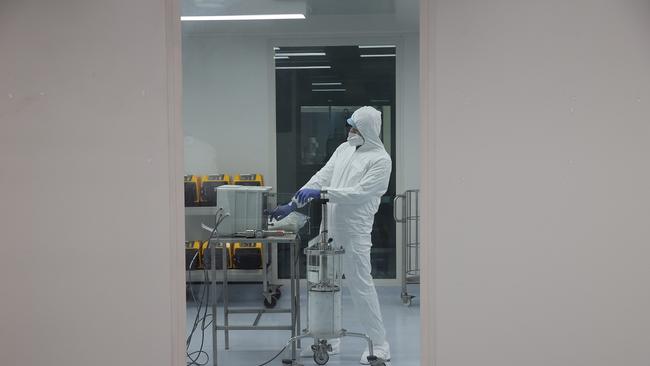Australia’s plasma monopoly is stifling biotech and our ability to create COVID treatments
Our company is on the cusp of commercialising a COVID-19 hyperimmune treatment, but we are being forced to source plasma from overseas.

Around half a million Australians generously donate blood, plasma or platelets each year. The donated plasma in particular, or “liquid gold” as we like to call it, is incredibly important because most of it is used to make and develop essential pharmaceutical products. At present, 100 per cent of that plasma goes directly to blood products’ giant CSL under a government approved agreement.
The contract with CSL is managed by the National Blood Authority (NBA), a statutory authority that represents the interests of the Australian, state and territory governments and sits within the Australian Government’s Health portfolio. It has been renewed several times since its inception and always without any of the usual provisions of tendering which underpin the Australian Government’s procurement of goods and services.
A major review of these arrangements, commissioned by the Australian Government in 2006, concluded that the national interest was best served by this situation, but this is no longer the case, because CSL is no longer the only Australian company with a fractionation facility to process plasma.
I am the co-founder and inventor of this second fractionation facility and, along with many other biotech leaders, am increasingly frustrated by the Government’s lack of support for our development, of which this plasma monopoly is a prime example.
Let me explain why this is a problem for us and for all Australians.
Our company is on the cusp of commercialising a COVID-19 hyperimmune treatment. We have a clinical trial underway and, all being well, will begin rolling out our treatment for frontline healthcare workers by the beginning of next year. The clinical trial and the manufacture of our treatment requires plasma which we are unable to access here because of the CSL monopoly. We have to source it from overseas instead.
More than 60 per cent of the world’s plasma is collected in the US. This is where we have been sourcing the majority of the plasma we need. But, with the growing risks to global supply posed by the disruption of collection and manufacturing logistics overseas and the possibility of trade wars, this is becoming increasingly difficult.
Knowing that we have a treatment that could make a huge difference to the lives of those most at risk of contracting COVID-19, and being unable to test and develop it quickly because of the lack of available plasma here is a terrible situation to be in. What is even more frustrating is that our technology only requires a fraction of the plasma usually required to run our clinical trials and make what could be a life-changing hyperimmune product.
And we are not alone. There are dozens of Australian biotech companies equally hindered by this arrangement and similar ones. It’s been said that Australian biotechs are great at basic discoveries but struggle to develop them into new drugs. Australia contributed less than one per cent of the new drugs approved by the US regulator over the last 25 years which is incredible when you consider the history this country has with medical discoveries. Outdated arrangements like the one with CSL are certainly contributing to this situation. The fact that Australian biotechs cannot access the base ingredient needed to research and develop their products because of a government-endorsed monopoly is simply wrong.
The Australian Government has an obligation to its citizens here and globally to change this situation. In fact, I believe there is an ethical duty on LifeBlood and the NBA to obtain the greatest yield of plasma derivatives possible from the plasma which Australians have donated for free to help other Australians. The use of technology like ours to fractionate some of the plasma LifeBlood collects will enable NBA to nearly double the amount of IVIG from collected plasma. This alone will enable Australia to be self-sufficient while concurrently removing the threat associated with bans and restriction imposed on the supply of plasma from the US.
It is difficult to see why our technology should not be immediately integrated into Australia’s system for the supply of plasma products. The practical step needed to bring this about is for the Australian Government to allow us, through the NBA, to accept and contract for the fractionation of Australian plasma. There are provisions within the National Blood Agreement underpinning current supply arrangements which would facilitate this progression. For Australia’s ability to address successive waves of the COVID-19 epidemic, it is crucial for this to be put in place as soon as possible.
That an Australian made product could be at the forefront of the global fight against COVID-19 should be supported and celebrated. The Government should be doing all it can to help us and other biotech companies like us by not endorsing monopolies on the base ingredients we need. It is not only stifling innovation in biotechnology and delaying the development of life-changing products, it’s an insult to the generous Australians who donate plasma. This gift deserves more respect.
Hari Nair is the co-founder and Executive Chairman of Australian biotechnology company Aegros.



To join the conversation, please log in. Don't have an account? Register
Join the conversation, you are commenting as Logout